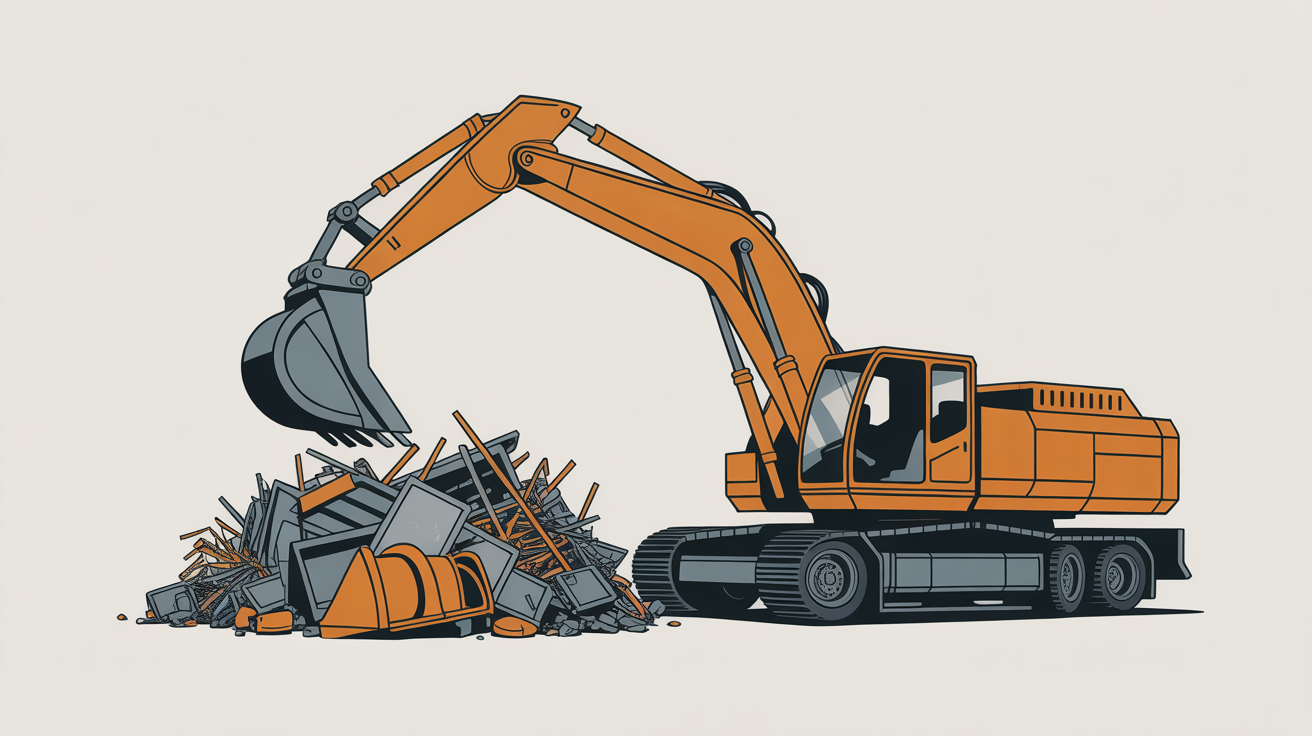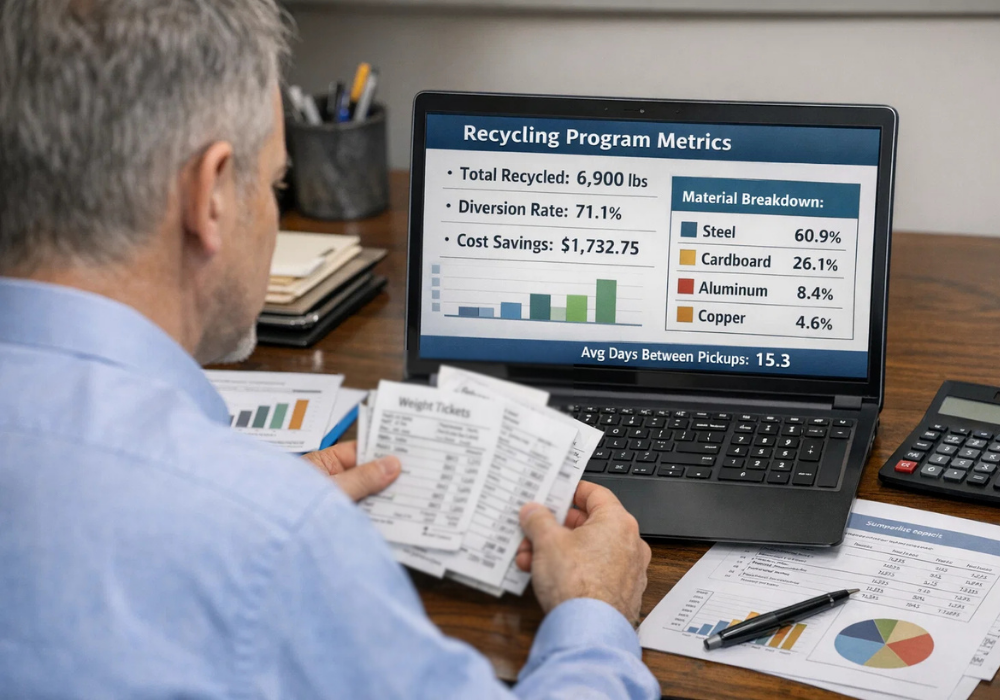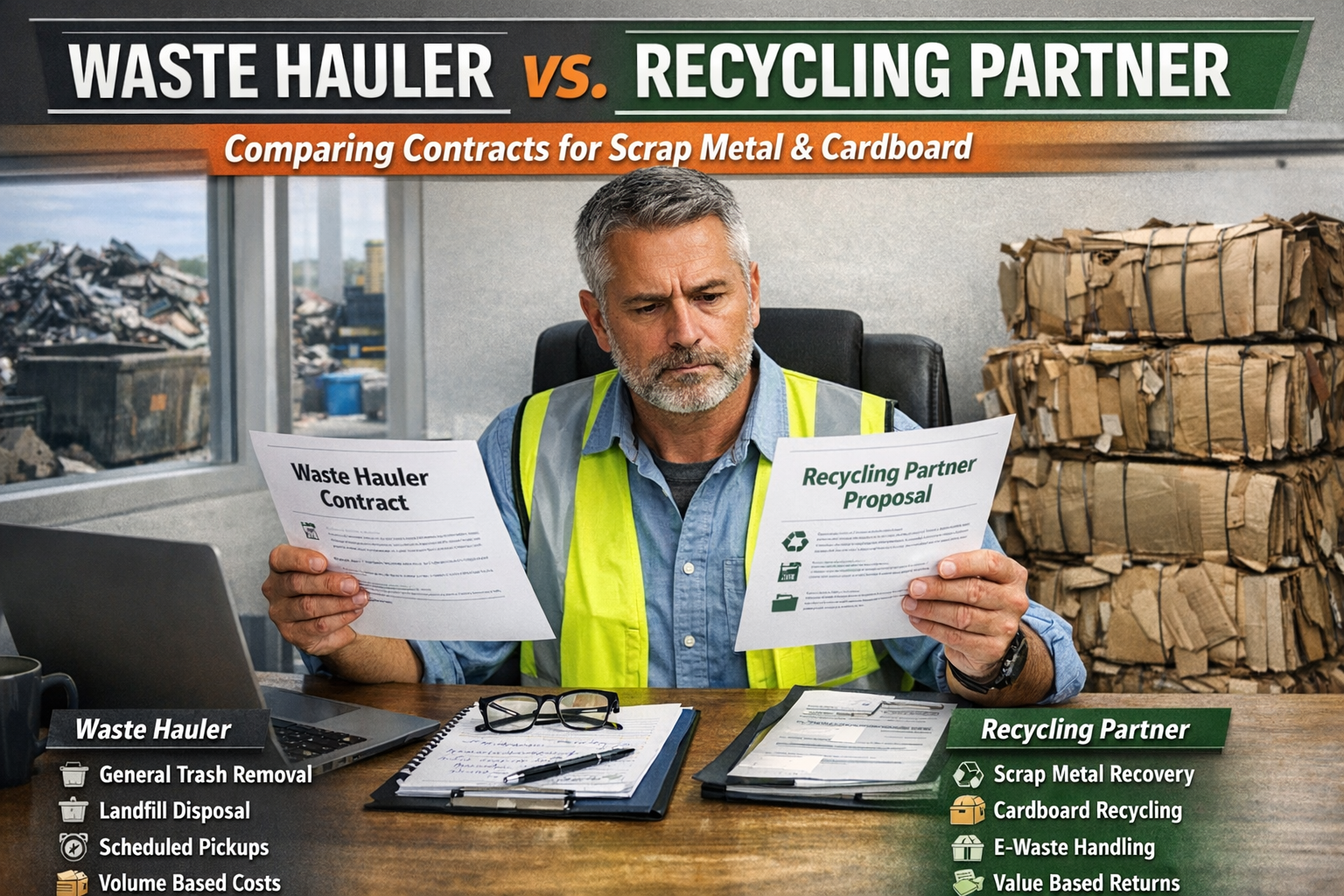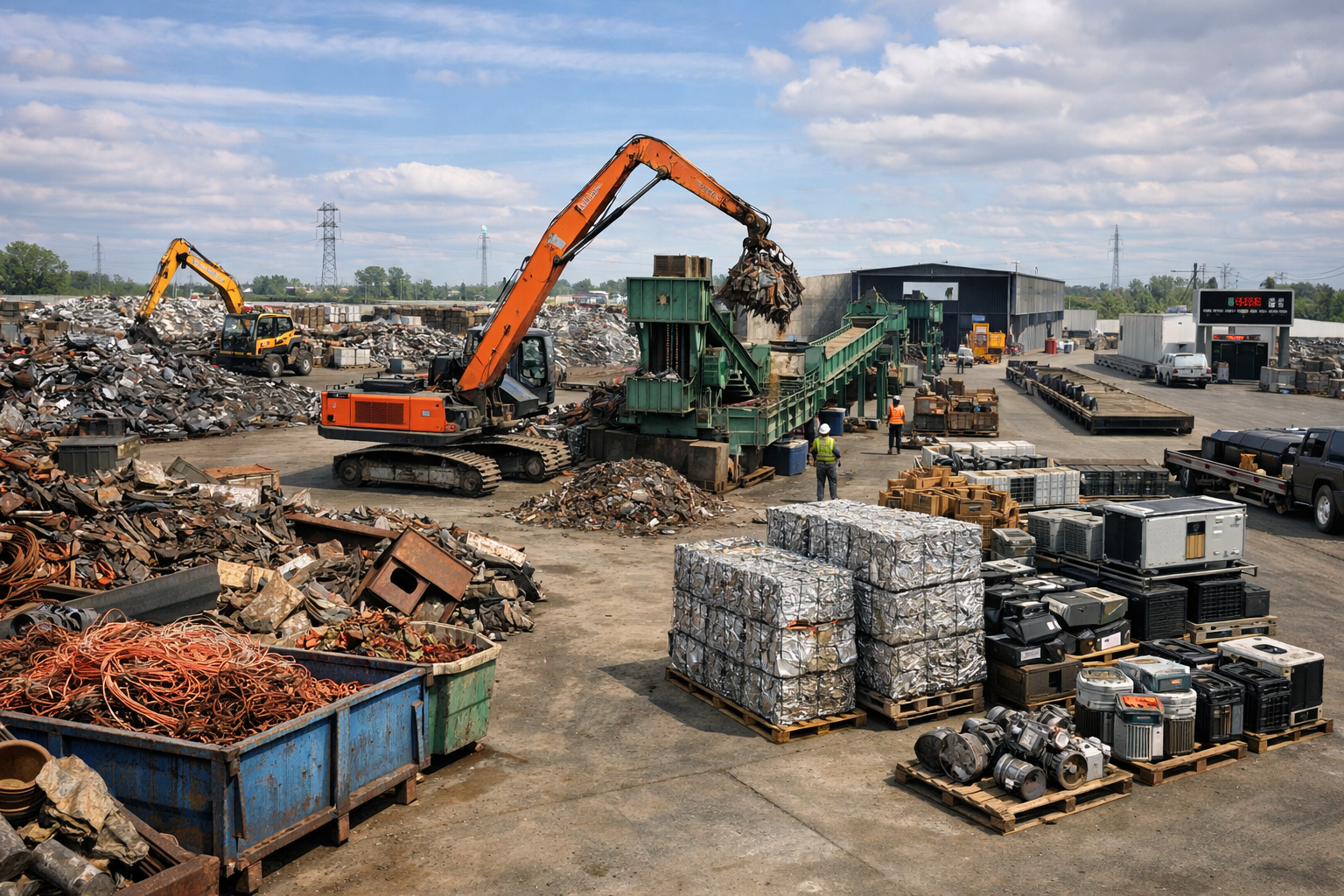Here's something most project managers figure out the hard way: that pile of "scrap" taking up space on your Sacramento job site? It's worth money. Sometimes serious money.
But only if you handle it right.
Over 15 years managing commercial recycling in Sacramento, I've watched contractors lose hundreds—even thousands—because they didn't understand how construction scrap metal removal Sacramento actually works. They mixed copper with steel, tossed everything into one dumpster, or called for pickup at the wrong time.
This guide changes that. Let's talk about what really matters: staging your metals to get top dollar, understanding what affects pricing (it's not just weight), scheduling pickups that don't slow your project, and staying compliant with California's regulations.
Whether you're running a demo job in Midtown or building new construction in Natomas, this is what you need to know.
Why Construction Sites Are Gold Mines (Literally)
Construction and demolition projects generate metal. Lots of it.
Structural steel from teardowns. Copper wiring from electrical rough-ins. Aluminum from window replacements. Even brass fittings from plumbing work. Most of this gets treated like trash when it should be treated like revenue.
Think about your last project. How much rebar got tossed? How many offcuts of copper pipe? That stuff adds up fast—and construction scrap metal removal Sacramento services will pay for it if it’s handled correctly.
The problem? Most contractors don't realize there's a right way and a wrong way to do this. The wrong way means you get generic pricing on mixed loads. The right way can boost what you're paid by 40-50% or more.[1]
The Metals You're Working With
Not all scrap is created equal, and knowing the difference matters for your bottom line.
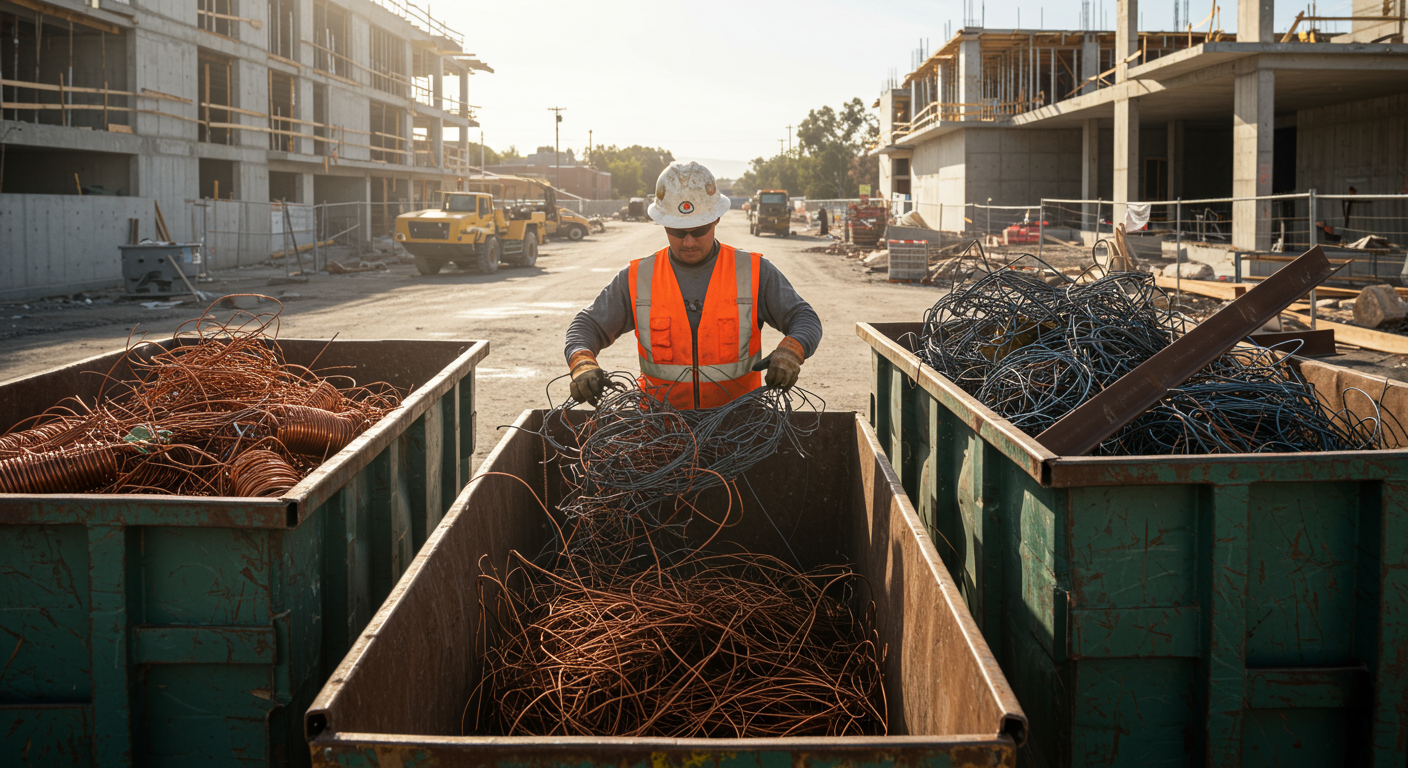
Ferrous Metals (the magnetic ones):
Structural steel beams
Rebar and reinforcement bar
Steel pipes
Metal roofing panels
I-beams and angle iron
These are valuable in bulk. The heavier, the better. Sacramento recyclers typically require minimum volumes—often 500 pounds or more—before they'll pay for ferrous metals.[7]
Non-Ferrous Metals (the ones that pay more):
Copper pipes and wiring
Aluminum siding and window frames
Brass fixtures
Stainless steel components
Here's where pricing gets interesting. Non-ferrous metals command significantly higher prices per pound than ferrous. As of 2025, clean aluminum scrap trades around $0.50-$0.80 per pound in California markets,[26][27] while prepared steel might fetch a fraction of that.
And copper? That's the prize. Depending on grade and cleanliness, you're looking at premium pricing that makes it worth your crew's time to keep separate.[22][23]
Want to know if something's ferrous or non-ferrous? Grab a magnet. Sticks? Ferrous. Doesn't stick? Non-ferrous, and probably worth more.
Staging: The Difference Between Good Money and Great Money
Here's where most contractors leave cash on the table.
When you mix metals together—copper wire tangled with steel offcuts, aluminum siding thrown in with rebar—recyclers pay you for the lowest-value material in the batch. They have to. Sorting mixed loads costs time and labor, and that cost comes out of what they pay you.[15]
But separate your metals on-site? Now you're talking better rates. Sometimes dramatically better.
How to Set Up Your Site
Create designated zones. You don't need a complicated system. Three areas work for most jobs:
Steel/ferrous area (rebar, structural steel, metal roofing)
Copper section (wiring, pipes, fittings)
Aluminum zone (siding, frames, trim)
Some contractors use different colored tarps or chalk marks on the ground. Others prefer separate roll-off containers if there's room. The method matters less than consistency—train your crew once, and the separation happens automatically.
Remove what doesn't belong. This is crucial for pricing.
See that copper wire with rubber insulation still attached? That insulation drops the value. Now, whether it's worth your time to strip it depends. The pricing difference between bare bright copper and insulated copper can be substantial—some sources suggest 40-65% more for stripped wire.[22][23][24] But if your crew's time costs more than the price bump, leave it on.
The same logic applies to steel with concrete attached, aluminum with rubber gaskets, or brass with plastic fittings. Clean is better, but only if cleaning doesn't eat your profit.
The Container Question
Sacramento contractors typically have two options:
Roll-off containers work great when:
Your project runs several weeks or months
You have space for container placement (usually need 12-15 feet of clearance)
You're generating steady scrap volume
You're primarily producing one metal type in bulk
Most recycling services will drop a container, let it sit, then swap it out when full. This keeps your site clear without constant coordination.
Flatbed/direct pickup makes sense when:
You're doing a one-time removal
Site access is tight
Your scrap is already staged and sorted
You've got mixed metal types you've separated yourself
Many contractors use both on larger projects—containers for ongoing ferrous scrap, scheduled flatbed pickups for accumulated high-value non-ferrous materials.
Sacramento Scheduling: Timing Your Pickups
Construction schedules are complicated enough without adding recycling logistics to the mix. But getting pickup timing wrong creates problems—either scrap piles up and becomes a safety hazard, or you pay for multiple pickups when one would've worked.
When to Call for Service
Demo projects: Schedule pickups after major phases. Did the interior strip-out? Call for a pickup. Structural demo complete? Another pickup. This keeps the site workable without having trucks show up every other day.
New construction: Most active builds need pickup every 2-4 weeks. You're generating scrap as you go—electrical rough-in produces copper, framing creates steel offcuts, exteriors generate aluminum. Let it accumulate to worthwhile volumes, then schedule.
Renovations: Smaller projects might need just one or two pickups total. Many contractors schedule around permit inspections or major milestones.
Sacramento Lead Times
Can you get same-week service in Sacramento? Often, yes. But several factors affect availability:
Spring and summer are peak construction seasons in Northern California. Everyone's building, everyone's generating scrap. That's when lead times stretch. Book 5-7 days ahead during busy months (April through September).
Winter and early spring? You can usually get faster service—sometimes even next-day for straightforward pickups.
Volume matters too. If you're calling for 200 pounds of mixed metal, expect longer wait times than if you're scheduling pickup of several tons of sorted materials. Recyclers prioritize larger commercial jobs, especially when the scrap is already staged and separated.
Site Access Matters More Than You Think
I've seen pickups delayed because nobody thought about truck access. Before you schedule, ask yourself:
Can a truck actually reach the staging area? (Some residential areas have tight turns or low-hanging lines)
What's the weight restriction on your site's entry? (Loaded scrap trucks are heavy)
Does pickup need to happen during specific hours? (Many Sacramento commercial sites restrict truck traffic to morning hours)
Is there room to maneuver, or will the driver need to hand-load everything?
Communicating these details upfront prevents delays and unexpected fees.
Pricing: What Actually Affects What You Get Paid

Here's what matters for scrap metal pricing in Sacramento. Some of this you can control. Some you can't.
Volume and Weight
More is better. Always has been, always will be.
Why? Because recyclers are middlemen. They collect from you, then sell in bulk to processors and mills. The more they can aggregate, the better their margins, so they pass some of that benefit to you.
This is why some Sacramento recyclers don't pay for small amounts of ferrous metal—it's not worth the truck roll. But bring in several tons? Now you're talking business.[7]
Metal Type and Grade
Not all copper is equal. Not all aluminum commands the same price. Recyclers grade metals based on purity and composition.
For copper, you've got:
Bare bright: Clean, uncoated, unalloyed copper wire—top dollar
#1 copper: Clean pipe or wire, no solder or paint—excellent pricing
#2 copper: Minor contamination like solder or oil—good pricing but notably less
For aluminum:
Clean extruded: Channel, tubing, solid pieces—premium rates
Cast aluminum: Clean castings without steel or rubber—good rates
Aluminum breakage: Contains steel or other contaminants—reduced pricing
The difference between grades can be significant. Understanding what you have helps set realistic expectations.[26][27]
Contamination Is the Silent Profit Killer
Remember that pricing difference I mentioned? Here's where it shows up.
Metal that's mixed with other materials—rubber, plastic, wood, concrete—gets downgraded. Sometimes heavily. The recycler either has to separate it (costing time) or sell it at a lower grade (costing them money). Either way, you get less.[13][28]
Taking five minutes to pull rubber gaskets off aluminum or cutting wood braces away from steel can meaningfully impact your check.
Market Conditions
This is the part you can't control, but you should understand.
Scrap metal prices fluctuate. Daily, sometimes. They're tied to:
Demand from industries that use metals (construction, manufacturing, auto makers)[19]
Global supply and demand, particularly from countries like China and India that import scrap[31]
Energy and fuel costs, which affect processing and transportation[13][32]
Virgin metal prices—when newly mined metal gets expensive, scrap becomes more valuable as an alternative[33]
Scrap metal prices fluctuate. Daily, sometimes. They're tied to:
Distance and Logistics
Location affects pricing more than most contractors realize.
Sacramento metro sites typically see better rates than jobs in remote areas. Why? Transportation costs. If a recycler has to drive an hour each way to pick up your load, that fuel and driver time comes out of what they can pay you.[30]
This doesn't mean rural projects can't get fair pricing—just that location factors into the equation.
California Compliance: What Sacramento Contractors Must Know
California doesn't mess around with scrap metal regulations.
California has strict scrap metal recycling laws. Any construction scrap metal removal Sacramento service must comply with ID verification, recordkeeping, and payment regulations.
Documentation Requirements
Every legitimate scrap transaction in California requires documentation. Recyclers must record:[20][21][34]
Valid government-issued photo ID (driver's license typically)
Description of materials sold
Weight and value
Date and time
Often a photograph of the seller
These records get kept for two years minimum. Law enforcement can inspect them anytime.[17][23]
For construction contractors, this means having the right person handle the transaction—someone authorized to sell on the company's behalf, with proper ID.
Payment Regulations
Here's where California gets specific. For non-ferrous materials (copper, aluminum, brass, stainless) valued over $20, the law requires:[17][38]
Three-day waiting period. Payment comes via non-transferrable check that you pick up three business days later or have mailed to your address.
Cash payment exception. If you're a frequent seller—five or more transactions per month, on five or more different days—you can receive cash immediately after establishing this pattern.
For construction companies doing regular business, building this relationship makes payment faster.
Why These Rules Matter
Some contractors see regulations as hassle. But they're actually protecting your business. The documentation trail: Makes it harder for stolen materials to be sold.
Proves you legally owned and sold the materials
Protects you if questions arise about material origin
Demonstrates compliance for project audits
Provides records for accounting and tax purposes
Environmental Benefits (That Also Help Your Bottom Line)
California takes waste diversion seriously. Many jurisdictions require construction projects to divert 65% or more of waste from landfills.[19][20]
Recycling scrap metal checks that box while generating revenue—probably the only compliance requirement that pays you to follow it.
The environmental math works out too. Recycling metals uses dramatically less energy than producing from raw ore—up to 95% less for aluminum, substantial savings for steel and copper.[21] Every pound you recycle reduces mining, cuts emissions, and keeps materials in productive use.
For contractors working on LEED projects or other sustainability-focused builds, documented metal recycling adds points toward certification.
Choosing a Recycling Partner in Sacramento
When selecting a construction scrap metal removal Sacramento partner, look for:
Licensing and compliance. California requires scrap metal recyclers to register with the Department of Justice. They need proper permits, especially if operating weighmaster scales.[21][35] Working with properly licensed operations protects you legally.
Commercial experience. Residential-focused services might not have the equipment or processes for construction-scale loads. You want a partner who regularly handles jobsite pickups, understands site constraints, and has trucks/containers sized appropriately.
Transparent pricing. Reputable recyclers explain how they calculate rates. If someone won't discuss pricing methodology or seems vague about market factors, that's a red flag.
Equipment and capacity. Can they handle your volume? Do they have various container sizes? Will they bring appropriate trucks for your access situation?
Flexibility. Construction schedules change. Find a partner who works with that reality rather than against it.
Making It Work: Practical Tips from the Field
After years of working with Sacramento contractors, here's what separates those who maximize scrap value from those who leave money on the table:
Start separation early. Don't wait until project end to think about scrap. Set up your system on day one. It takes 10 minutes to establish zones and explain the process to your crew.
Track volumes. Even rough estimates help you schedule pickups efficiently. You don't want trucks showing up for 200 pounds of metal when you thought you had two tons.
Build relationships. Regular customers often get better pricing and service priority. If you're running multiple projects, work with the same recycler when possible.
Communicate site specifics. The more your recycler knows about access, timing constraints, and site conditions before the truck rolls, the smoother the pickup goes.
Document everything. Keep copies of weight tickets, transaction records, and payment documentation. You'll want them for accounting, and you might need them for project audits or compliance verification.
Know your minimums. Many recyclers have volume thresholds, especially for ferrous metals. Understand what these are before scheduling, so you're not surprised by a rejection or reduced pricing on small loads.
Common Questions Sacramento Contractors Ask
Q: Should I strip insulation off copper wire before recycling it?
It depends. The price differential exists—bare bright copper commands substantially more than insulated wire, sometimes 40-60% more depending on current market conditions.[22][23][24] But your decision should factor in labor costs.
If you're paying crew members $30-40/hour to strip wire, and the value difference doesn't exceed their time, leave the insulation on. Most recyclers accept insulated wire; they just price it as a lower grade.
For large volumes of heavier gauge wire where stripping goes quickly, it might be worth it. For smaller amounts or complex insulation, probably not.
Q: Can I mix different metals in the same container?
You can, but you'll get paid for the lowest-value metal in the mix. Recyclers need to sort mixed loads, and that processing cost comes out of your payment.[15]
If site constraints make separation impossible, mixed loads are fine—you'll still get paid fairly for what it costs to process. But whenever possible, keeping metals separate increases what you receive.
Q: How quickly can I get a pickup in Sacramento?
During slower months (winter and early spring), often within a few days. During peak construction season (late spring through fall), allow 5-7 days for scheduling, especially for large commercial pickups.
Emergency or rush service sometimes available, but may include additional fees. Plan ahead when possible.
Q: What's the minimum amount for pickup?
This varies by recycler and metal type. Many Sacramento services require minimums for ferrous metals—500 pounds or more is common.[7] For non-ferrous metals like copper and aluminum, minimums are typically lower, but calling with just a few pounds isn't practical.
If you're generating small volumes, accumulate materials across multiple projects before scheduling pickup.
Q: Do prices change, and how often?
Daily, in some cases. Scrap metal pricing follows commodities markets, which fluctuate based on global supply and demand, energy costs, and industrial activity.[13][31][32]
Most recyclers update their prices regularly—some daily, others weekly. For large sales, it can pay to track trends and time your transaction when prices are favorable. For smaller amounts, timing markets isn't usually worth the hassle.
Q: Can metal recycling help meet California waste diversion requirements?
Absolutely. Many California jurisdictions require construction projects to divert 65% or more of waste from landfills.[19][20] Metal recycling contributes toward this requirement while generating revenue.
Keep documentation from your recycling transactions—weight tickets showing materials recycled—for compliance reporting.
Ready to Turn Scrap Into Value?
Managing construction scrap metal properly isn't complicated once you understand the basics. Stage materials by type, remove obvious contaminants, understand what affects pricing, schedule pickups efficiently, and work with licensed recyclers who know Sacramento's commercial construction landscape.
The payoff? Cleaner job sites, better pricing on materials, compliance documentation, and cash back into your project budget.
For Sacramento contractors looking to improve their scrap metal management, the approach outlined here delivers results. Set up your staging system, train your crew, establish a relationship with a reliable recycling partner, and start tracking volumes.
That pile of "scrap" on your site? It's revenue waiting to happen. Handle it right, and you'll see the difference in your next payment.
Final Takeaway
Managing construction scrap metal properly isn’t complicated—it’s strategic.
Stage your metals by type, remove contaminants, understand pricing factors, and work with licensed construction scrap metal removal Sacramento professionals. The payoff? Cleaner job sites, better pricing, and more profit back into your budget.
That pile of “scrap” on your job site isn’t waste—it’s opportunity. Handle it right, and your next payment will prove it.
Works Cited
[1] Cohen — "Effective Construction Scrap Management: How To Guide." https://www.cohenusa.com/blog/how-to-manage-construction-scrap/. Published: June 28, 2022. Accessed: October 25, 2025.
[2] Action Metals Recyclers — "How to Recycle Metal Waste from Construction Sites." https://www.actionmetalsrecyclers.com/how-to-recycle-metal-waste-from-construction-sites/. Published: December 12, 2024. Accessed: October 25, 2025.
[3] Verichek — "Scrap Metal Recycling 101 [A Complete Metal Scrapper's Guide]." https://verichek.net/scrap-metal-recycling.html. Published: October 17, 2024. Accessed: October 25, 2025.
[7] TKO Recycling — "Sacramento Recycling Center." https://tkorecycling.com/. Published: October 26, 2011. Accessed: October 25, 2025.
[13] Morecambe Metals — "5 Factors That Affect the Price of Scrap Metal." https://www.morecambemetals.co.uk/5-factors-that-affect-the-price-of-scrap-metal/. Published: April 30, 2025. Accessed: October 25, 2025.
[15] RCM Recycling — "Strategies For Effective Construction Scrap Management." https://www.rcmscrapmetal.com/strategies-for-effective-construction-scrap-management. Accessed: October 25, 2025.
[17] Nexus Recycle — "California Scrap Metal Laws." https://nexusrecycle.com/scrap-metal-laws-by-state.php?state=CA&name=California. Accessed: October 25, 2025.
[19] City of Laguna Niguel — "CD Waste Reduction and Recycling." https://www.cityoflagunaniguel.org/1170/CD-Waste-Reduction-and-Recycling. Accessed: October 25, 2025.
[20] CalRecycle — "Construction and Demolition Waste." https://www2.calrecycle.ca.gov/Docs/Web/126534. Accessed: October 25, 2025.
[21] CalRecycle — "C&D Model Specifications." https://calrecycle.ca.gov/lgcentral/library/canddmodel/. Accessed: October 25, 2025.
[22] Reddit ScrapMetal — "Price diff on stripped vs unstripped copper wire." https://www.reddit.com/r/ScrapMetal/comments/vn8c0u/price_diff_on_stripped_vs_unstripped_copper_wire/. Accessed: October 25, 2025.
[23] Okon Recycling — "Scrap Metal Copper Prices." https://www.okonrecycling.com/industrial-scrap-metal-recycling/copper-recovery/scrap-metal-copper-prices/. Accessed: October 25, 2025.
[24] Reliable Recycling Center — "Pricing." https://www.reliablerecyclingcenter.com/pricing/. Accessed: October 25, 2025.
[26] Scrap Monster — "Aluminum Scrap Prices Florida." https://www.scrapmonster.com/scrap-yard/price/aluminum-scrap/florida/1/3374. Accessed: October 25, 2025.
[27] Metaloop — "Scrap Metal Price United States Aluminium." https://www.metaloop.com/scrap-metal-price/united-states/aluminium/. Accessed: October 25, 2025.
[28] London Metal Recycling — "5 factors that affect the price of scrap metal." https://londonmetalrecycling.co.uk/5-factors-that-affect-the-price-of-scrap-metal/. Published: May 16, 2025. Accessed: October 25, 2025.
[30] Scrap Gators — "Understanding the Factors that Influence Scrap Metal Prices." https://www.scrapgators.com/understanding-the-factors-that-influence-scrap-metal-prices/. Published: June 8, 2023. Accessed: October 25, 2025.
[31] Sgt. Scrap — "What Causes Scrap Metal Rates to Fluctuate?" https://sgt-scrap.com/blog/factors-that-affect-scrap-metal-rates/. Published: October 27, 2023. Accessed: October 25, 2025.
[32] Cohen — "3 Factors That Impact Scrap Metal Pricing." https://www.cohenusa.com/blog/factors-that-impact-scrap-metal-pricing/. Published: May 31, 2022. Accessed: October 25, 2025.
[33] Scrap Metal Services — "Factors that Affect Scrap Metal Prices." https://scrapmetalservices.com/factors-affect-scrap-metal-prices/. Published: November 8, 2019. Accessed: October 25, 2025.
[34] Okon Recycling — "Scrap Metal Requirements in California: A Quick Overview." https://www.okonrecycling.com/industrial-scrap-metal-recycling/specialty-metals/scrap-metal-requirements-california/. Published: September 24, 2025. Accessed: October 25, 2025.
[35] P&T Metals — "Scrap Metal Rules and Regulations You Should Be Aware About." https://www.ptmetals.com/blog/scrap-metal-rules-and-regulations/. Published: July 2, 2025. Accessed: October 25, 2025.
[38] iScrap App — "California Scrap Metal Laws." https://iscrapapp.com/scrap-laws/california/. Published: October 4, 2021. Accessed: October 25, 2025.
Frequently Asked Questions
How should contractors stage scrap metal on Sacramento construction sites?
Create three designated zones: one for ferrous metals (steel, rebar), one for copper (wiring and pipes), and one for aluminum (siding, frames). Use separate containers, colored tarps, or marked areas. Keeping metals separated from the start prevents mixing and increases payment by avoiding the need for recycler sorting. Remove non-metal attachments like rubber, plastic, and wood when practical. If you have adequate space—typically a few hundred square feet—on-site separation can increase your scrap value significantly compared to mixed loads.
What affects scrap metal pricing for construction projects in Sacramento?
Multiple factors determine pricing: metal type and grade (copper commands premium rates, aluminum mid-tier, ferrous metals bulk pricing), volume and weight (larger quantities negotiate better rates), contamination level (clean sorted materials receive substantially higher payment than mixed or contaminated loads), current market conditions (prices fluctuate daily based on industrial demand and global markets), and distance from recycling facilities (Sacramento metro sites typically see better rates than remote locations due to transportation costs). The price difference between clean and contaminated materials can be substantial.
How quickly can construction contractors schedule scrap metal pickup in Sacramento?
During slower winter and early spring months, many recyclers offer pickup within 2-4 days. Peak construction season from April through September typically requires 5-7 days advance scheduling for commercial projects. Lead time depends on volume (larger sorted loads get priority), site access conditions, and equipment needs. Same-day or next-day service occasionally available for emergency situations but may include additional fees. Building an ongoing relationship with a recycler often improves scheduling flexibility.
What documentation do California regulations require for construction scrap metal sales?
California law requires scrap metal recyclers to collect and maintain records for two years including valid government-issued photo identification, description and weight of materials, transaction value, date and time, and often photographs of seller and materials. For non-ferrous metals valued over $20, payment comes via non-transferrable check after a three-day hold, unless you're a frequent seller conducting five or more transactions monthly. Keep copies of all weight tickets and payment records for project accounting and compliance verification.
Should construction contractors strip insulation from copper wire before recycling?
The decision depends on labor costs versus value increase. Bare bright copper commands 40-60% more than insulated copper wire in current markets. However, if crew labor costs exceed the price differential, leave insulation on—recyclers accept insulated wire at lower grades. For large volumes of heavy-gauge wire where stripping is quick, removing insulation increases value. For small amounts or wire with complex insulation, the labor investment usually isn't worthwhile. Calculate your specific situation before committing crew time to stripping.
Can construction scrap metal recycling help meet California waste diversion requirements?
Yes. Many California jurisdictions require construction and demolition projects to divert 65% or more of waste from landfills. Metal recycling contributes significantly toward this requirement while generating revenue. Maintain documentation from recycling transactions—weight tickets showing materials and volumes—for compliance reporting and project audits. This makes metal recycling one of the few regulatory requirements that actually pays you to comply while supporting California's environmental goals.
